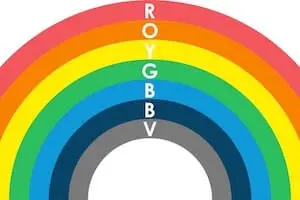The phrase ‘Richard of York gave battle in vain’, often shortened to ROYGBIV, is intended to aid the recall of the colours of the rainbow
Red, Orange, Yellow, Green, Blue, Indigo, Violet.
The phrase ‘Richard of York gave battle in vain’, often shortened to ROYGBIV, is intended to aid the recall of the colours of the rainbow
Red, Orange, Yellow, Green, Blue, Indigo, Violet.
This expression one of the many that are invented as mnemonic aids, that is, patterns of letters or associations which help us remember something.
If we have already know the history of the English Wars of the Roses, then ‘Richard of York gave battle in vain’ makes sense and is easy to remember. Many people generally don’t know that history, so here’s a little background.
The best known Richard of York who did badly in battle (and there was more than one) was the English king Richard III. It is probably him who is being referred to with ROYGBIV. Richard was the last English king to die in battle, in 1485 at the Battle of Bosworth Field. He was the king who Shakespeare gave the line ‘A horse, a horse, my kingdom for a horse‘.
Of course, the memory aid has to be easier to remember than whatever it is that we are hoping it will help us recall. The linking of the words of the aid into a meaningful sentence makes it easier to remember than a random list of objects.
Another well-known example is:
My very excited mother just served us nine pies
which aids the recall of the order of the planets – Mercury Venus Earth Mars Jupiter Saturn Uranus Neptune Pluto. Or, for those who no longer count Pluto as a planet – My very excited mother just served us noodles.
As to the origin of ‘Richard of York gave battle in vain’ I don’t know and don’t expect to find out. What does seem to be known is that the acronym ROYGBIV came first and some unknown person made up the phrase to match it.
I can’t find Richard of York gave battle in vain in print prior to the 1970s. It is certainly older than that and I recall being taught it at school in the 1960s. The lack of any appearance in print from the first half of the 20th century does indicate that it is almost certainly post WWII in date.
The word, if that’s what we can call it, ‘rogbiv’ is much older. Here’s a use of it from the American newspaper The Moline Review-Dispatch, May 1879:
Sam Davis says that the rainbow has seven colours: red, orange, yellow, green, blue, indigo and violet. And the way Sam remembers this fact is because his school teacher impressed upon him – probably with a switch – the word Roygbiv. That word gives the initials of the seven colours of the rainbow.

A B C D E F G H I J K L M N O P Q R S T UV W XYZ
American Animals Australian Bible Body Colour Conflict Death Devil Dogs Emotions Euphemism Family Fashion Food French Horses ‘Jack’ Luck Money Military Music Names Nature Nautical Numbers Politics Religion Shakespeare Stupidity Entertainment Weather Women Work
Have you spotted something that needs updated on this page? We review all feedback we receive to ensure that we provide the most accurate and up to date information on phrases.